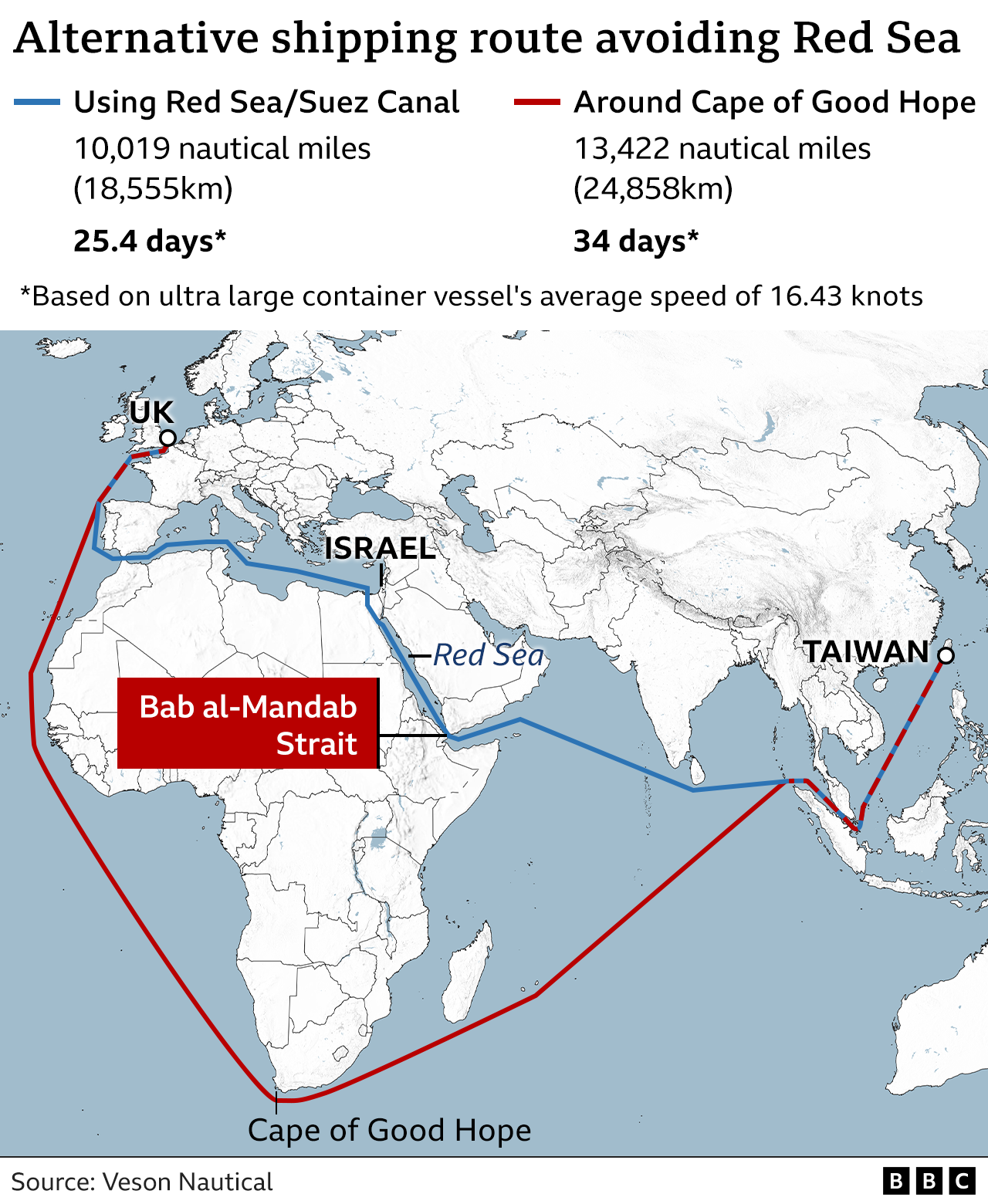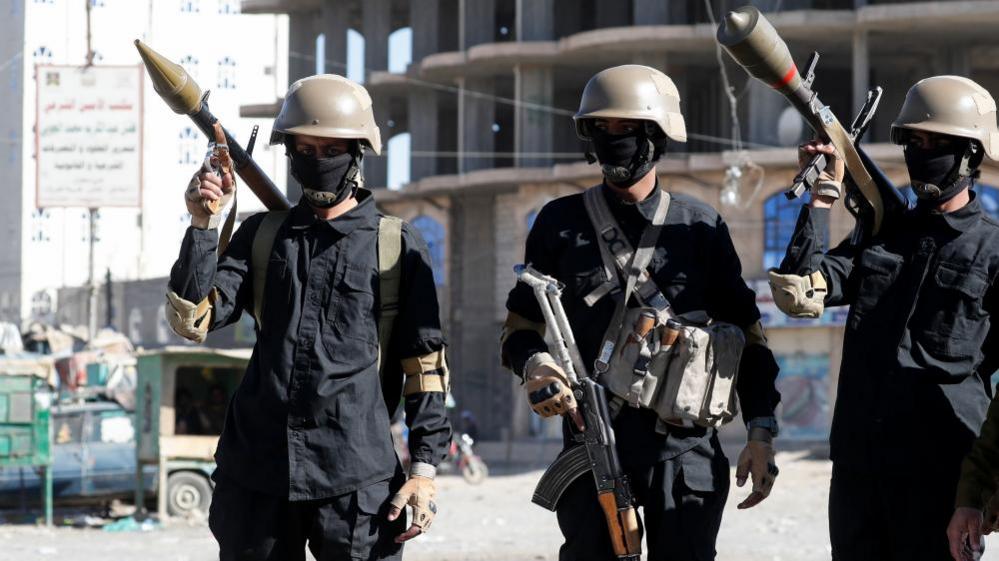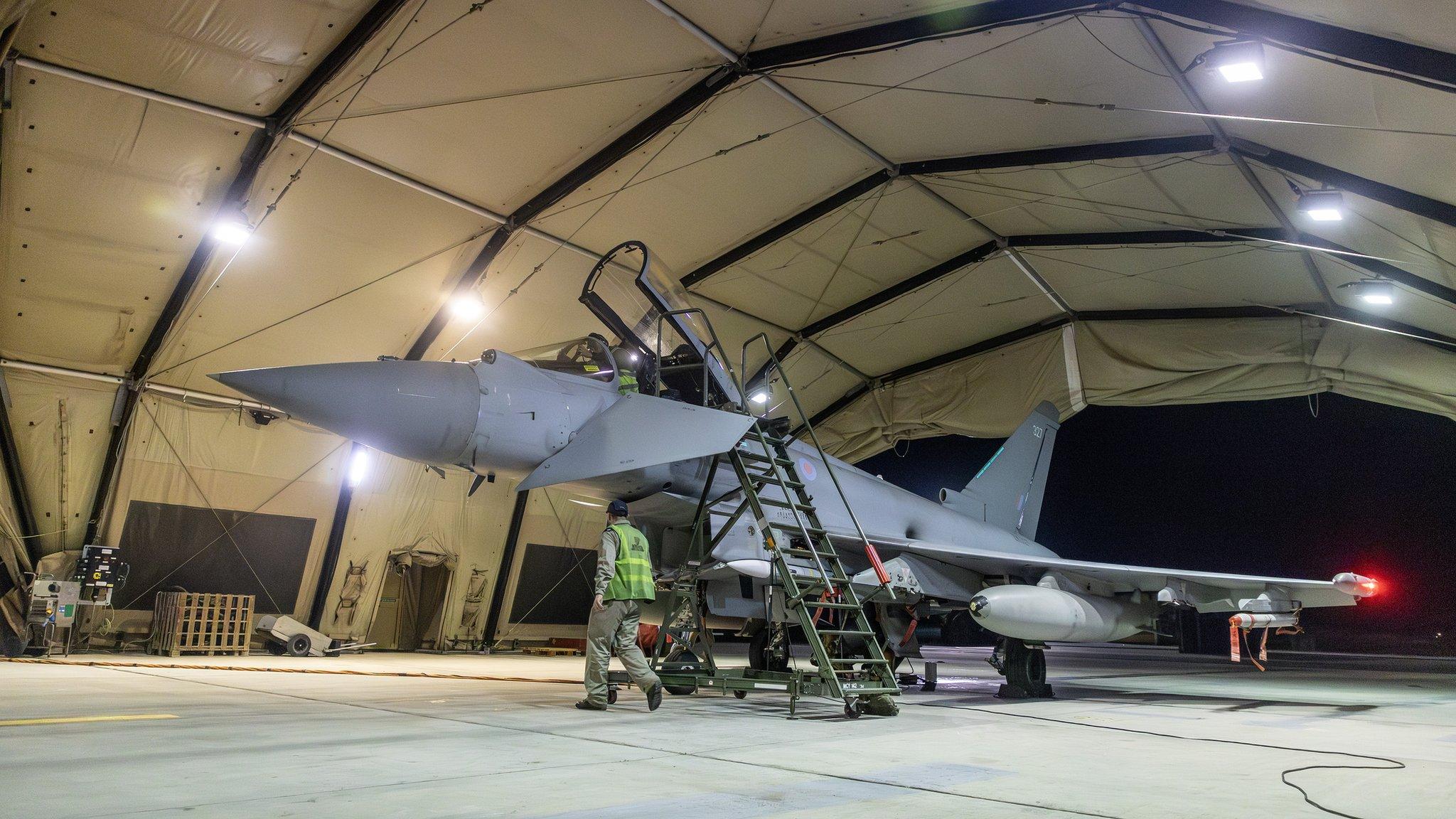UK will back words with actions against Houthis in Yemen - Cameron
- Published
Watch: Lord Cameron says Houthis have escalated tensions in Middle East
Foreign Secretary David Cameron said the UK is "prepared to back our words with actions" against the Houthis, after taking military action in Yemen over their attacks in the Red Sea.
Lord Cameron told the BBC the US-UK air strikes were needed after months of attacks on shipping, despite warnings.
Sir Keir Starmer said he had backed the operation as "action had to be taken".
But the Labour leader said he would consider whether to support further action "on its merit".
Looking at the global security situation on the BBC's Sunday with Laura Kuenssberg programme, Lord Cameron cautioned it is "hard to remember a more unstable, dangerous and uncertain world".
He said the "red lights on the global dashboard are very much flashing", given ongoing wars in Ukraine, the Middle East and Africa.
Lord Cameron said the UK had given the Houthis, who are key allies of Hamas, "warning after warning" before joining US-led strikes, which were launched to protect global shipping.
The Houthis are a political and military group which control a large part of Yemen, including the capital. They are backed by Iran, Israel's arch-enemy and claim they target any ship travelling to, or owned by, Israel.
They have carried out at least 27 attacks since 19 November, according to the US, and have launched a series of drones and missiles towards Israel.
The group's attacks on cargo ships - some of which have no clear connection to Israel - have led major shipping companies to divert vessels away from the Red Sea, instead taking a longer route around southern Africa.
Confirming there would be a statement in Parliament about the strikes on Monday, Lord Cameron said a political debate before this kind of military action would not have been right "for reasons of operational security".
Asked if the attacks represented an escalation of the Israel-Gaza conflict, he denied this and told the BBC the Houthis were responsible for escalating their attacks on shipping in the vital sea lane since mid-November and the joint UK-US strikes were a "last resort".
He said: "The strikes themselves were limited, proportionate, targeted, legal, but they were also necessary."
Sir Keir told the programme he backed the UK military operation so far as "action had to be taken" to protect shipping in the Red Sea and that "sitting back and simply doing nothing" over the threat to global trade was not appropriate.
But he also said Labour would need to consider the arguments if the UK plans further attacks in Yemen and he would expect to be briefed by the government.
Asked if he had changed his position on whether the government has to give MPs a say on UK military action, Sir Keir denied this and said a vote was only needed when "deploying troops".
Keir Starmer says he backs strikes to stop Houthi attacks
Prime Minister Rishi Sunak has been criticised by some opposition parties for not consulting Parliament in advance of the strikes, though the government does not have to do this.
The Lib Dems and Plaid Cymru have said it is wrong that parliament was bypassed and the SNP's Westminster leader Stephen Flynn said the decision to launch air strikes against the Houthis without consulting MPs was "farcical".
The Houthis have said there was "absolutely no justification" for the attacks and that the group would continue to target Israeli ships, noting the air strikes have not affected their ability to do so.
On Sunday, prominent Houthi supporter Hussain Al-Bukhaiti told Laura Kuenssberg the group "only target Israeli-linked ships" or those heading towards ports there, because they have declared war on Israel.
Asked about attacks on unrelated ships, he questioned what international law was doing to protect civilians in Gaza from Israel's "mass-bombing" campaign.
On how the Houthis would respond to the air strikes, he said if attacks continue fighters could target US and UK battleships using "hundreds of drones and cruise missiles".
Houthis control north Yemen, capital Sanaa and the Red Sea coastline. The armed group declares themselves to be part of the Iranian-led "axis of resistance" against Israel, the US and wider West.

Lord Cameron and Sir Keir were asked about the deaths of five people trying to cross the English Channel overnight.
He said said it was "heartbreaking" to hear more people had died, "but it just shows we've got to stop the boats, we've got to stop this illegal trade in human beings."
The former PM said breaking the business model of people smugglers is why the government is pursuing the deal with Rwanda to send some asylum seekers to east Africa on a one-way ticket. Sir Keir called the deaths a "tragic loss of life" adding that "we need to smash those gangs". Rejecting the "gimmick" of the Rwanda scheme, he talked about the prosecution of gangs as Director of Public Prosecutions.
"Having seen this done for terrorist gangs, with guns and with drugs I refuse to believe we can't do anything about it," he said.
Lord Cameron was also asked about his private lobbying of ministers to try to secure an emergency pandemic loan scheme for disgraced financier Lex Greensill.
The former prime minister denied being paid £10 million to work on behalf of Greensill Capital, following his resignation as PM in 2016.
After refusing to tell Laura Kuenssberg how much he was paid, he said: "I was a private citizen, I had a number of different interests, the things I did, including important charitable work and I think as a private citizen you're entitled to do that."
Related topics
- Published12 January 2024

- Published12 January 2024
